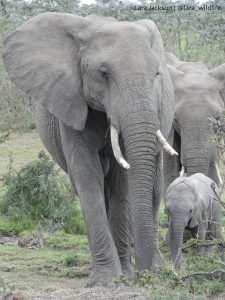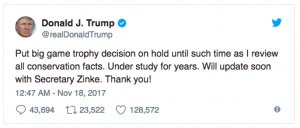Elephants are one of the most universally loved species and are instantly recognisable with their long trunks, large flapping ears and impressive tusks. However, their populations are experiencing catastrophic declines, and with fewer than 50,000 African elephants remaining in the wild, it’s possible that our children may only ever see these majestic creatures in captivity or a picture book.

There are currently more elephants being poached than born and in the past decade alone, there’s been a 90% decline in elephant populations across Africa. Elephants have an extraordinary emotional capacity which allows them to feel empathy and form deep familial bonds with their herd members. Not only are these creatures incredibly intelligent, they also play an essential role in the ecosystem and are often described as ‘ecosystem engineers’. In areas where elephants thrive, other species do too and the potential loss of Elephants could have severe implications regarding the function and capacity of their natural environment.

In November, the US government caused global outrage by announcing plans to lift the ban on the importation of elephant body parts hunted for sport in Zimbabwe and Zambia. Whilst hunting organisations like the Safari Club and National Rifle Association were overjoyed by the change in policy, conservationists and charities dedicated to saving elephants were appalled. The current pressure being exerted on elephant populations from illegal poaching, is the highest it’s been for over 20 years and this change in US legislation can only mean bad news for the remaining individuals in the wild.
In a statement given by the US Fish and Wildlife Service, they justified the decision by stating that “African Elephant trophy hunting in Zimbabwe will enhance the survival of the species in the wild”.
Although it’s a highly controversial issue, trophy hunting can provide crucial benefits to endangered and vulnerable species. This is because hunters will pay an extortionate amount of money (up to US$60,000) to shoot and export the animals that they kill. In theory, this money is invested into the conservation of remaining populations, for example, by funding law enforcement to prevent poaching; however, it’s often impossible to track the distribution of those funds.
For a species that is already so vulnerable, I can’t help but feel that this decision is a huge step in the wrong direction.
As a result of the immediate global backlash, Donald Trump tweeted that the decision to change legislation would be put on hold until all the conservation facts could be reviewed and so far, it appears that no definitive conclusion has been reached.

The World Wildlife Fund (WWF) wrote that this was a “wise and welcome pause in the process”, but, we’re not out of the woods yet.
In the meantime, it’s important that we continue to raise awareness of the plight of African Elephants and the magnitude of the threats that this remarkable species is facing on a daily basis.
This has been a piece by Lara Jackson.
www.larawildlife.co.uk | @lara_wildlife | larajwildlife@gmail.com
All these fantastic photo’s have also been taken by Laura, for more pictures like these she is well worth a follow.